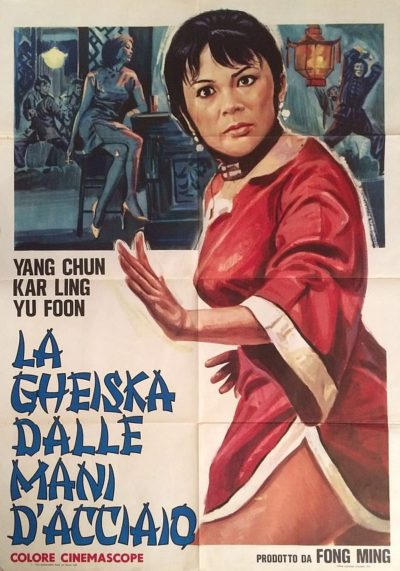★★
“Not so great…”
 I’m just going to begin by quoting the opening credit titles. Spelling, grammar and punctuation as received. “At the early stage of Republic of China, Yuan Hsi Hai wanted to rebel the democratic government & be the king. But there were 300,000 soldiers at Yuan Wan under the command of General Tsai obstructed his desire, so he cheated General Tsai to Peking & confined his movements. So Yuan who lived in Chu Jen Hall could fulfil his ambition but…” I reproduce this because, to a large extent, that’s everything I’ve got in terms of the over-arching plot here. It’s all about Tsai (Kwan) getting out of the city, in order to lead his troops and, presumably, frustrate Yuan’s dictatorial ambitions.
I’m just going to begin by quoting the opening credit titles. Spelling, grammar and punctuation as received. “At the early stage of Republic of China, Yuan Hsi Hai wanted to rebel the democratic government & be the king. But there were 300,000 soldiers at Yuan Wan under the command of General Tsai obstructed his desire, so he cheated General Tsai to Peking & confined his movements. So Yuan who lived in Chu Jen Hall could fulfil his ambition but…” I reproduce this because, to a large extent, that’s everything I’ve got in terms of the over-arching plot here. It’s all about Tsai (Kwan) getting out of the city, in order to lead his troops and, presumably, frustrate Yuan’s dictatorial ambitions.
Key to this is Peking Opera star Hsiao Yu (Lee), who is hired by Yuan’s men to keep an eye on the General. However, she’s not as loyal as her employer would hope, and she gradually becomes attached to and involved with Tsai. This eventually results in her helping him to escape the house arrest under which he has been placed. I believe this to be true with… let’s say 90% confidence. There does appear to be other stuff going on: none of it is able to make it through the terrible presentation, and out the other side, to provide details which I prepared to commit to the keyboard. It’s kinda clear why Lee’s Queen Boxer made it out in the West, and this didn’t, even though both were made around the same time.
This did rather well at Taiwan’s 1973 Golden Horse awards, winning Best Film, Leading Actor, Screenplay and a special award for “Outstanding Performance” going to Lee (she lost Best Leading Actress to Hsiao-Lao Lin in A Heroic Fight). All I can say is, it must have been a very slow year in cinema, for this largely plodding and uninteresting history-political drama to have triumphed. Though, again, the presentation does it no justice. For example, there’s one scene where Tsai is repeatedly writing something in large letters on paper. It’s clearly very important to him. Unfortunately, the subtitles – as ever, intended for a Chinese audience, not a Western one – don’t bother to translate it. So its significance is entirely lost.
Lee is about the only reason to watch this, and the film definitely goes up a gear whenever she’s on screen. Her background actually was in the Peking Opera, making this right in her wheel-house. The director – and some sources also credit both Kwan and Florence Yu Fung-Chi – wisely lets her talent shine through, and it’s a no-nonsense approach that works. Witness, for example, the casual way, she shoves a victim out of the way with her feet, after crushing his larynx. But one of the problems is, I honestly couldn’t tell you who’s she’s fighting at the end, or why, since the General has already escaped. It’s just another element lost in translation here, like so many others, and leaves this an underwhelming entity, in the only form available.
Dir: Min-Hsiung Wu
Star: Judy Lee, Peter Yang Kwan, Lee Hung, Cheung Kwong-Chiu




